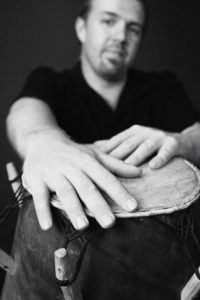Dr. Michael Vercelli
Clinic/master class on West African Gyil Performance
Tuesday, October 25, 2016
2:00 – 3:00
Room B120
 Dr. Michael B. Vercelli is the director of the World Music Performance Center at West Virginia University. Michael holds a Doctor of Musical Arts degree in Percussion Performance with a minor in Ethnomusicology from the University of Arizona. While well versed in the classical percussion repertoire, Michael’s specialty lies in non-Western instruments. He has studied the traditional music of other countries and done fieldwork in Bali, Cuba, Brazil, and primarily, Ghana. Dr. Vercelli has received many awards for both his performance and study of indigenous music such including a WVU Faculty Senate Research Grant for his project – “Remembering the Hunters: Preservation through Performance of the Ritual Birifor Funeral Music of Ghana.” At WVU, Dr. Vercelli also directs summer study abroad courses to Ghana and Brazil, focusing on music, dance and cultural emersion. Dr. Vercelli is a contributing author to the World Percussion chapter in the third edition of Gary Cook’s Teaching Percussion. He is a participating member in the Society for Ethnomusicology and Percussive Arts Society where he serves on the World Percussion Committee. Michael has given lectures, performances and workshops, across the United States, Mexico, Brazil, China and Iceland, and is a founding member of the Zumbumba Percussion Trio.
Dr. Michael B. Vercelli is the director of the World Music Performance Center at West Virginia University. Michael holds a Doctor of Musical Arts degree in Percussion Performance with a minor in Ethnomusicology from the University of Arizona. While well versed in the classical percussion repertoire, Michael’s specialty lies in non-Western instruments. He has studied the traditional music of other countries and done fieldwork in Bali, Cuba, Brazil, and primarily, Ghana. Dr. Vercelli has received many awards for both his performance and study of indigenous music such including a WVU Faculty Senate Research Grant for his project – “Remembering the Hunters: Preservation through Performance of the Ritual Birifor Funeral Music of Ghana.” At WVU, Dr. Vercelli also directs summer study abroad courses to Ghana and Brazil, focusing on music, dance and cultural emersion. Dr. Vercelli is a contributing author to the World Percussion chapter in the third edition of Gary Cook’s Teaching Percussion. He is a participating member in the Society for Ethnomusicology and Percussive Arts Society where he serves on the World Percussion Committee. Michael has given lectures, performances and workshops, across the United States, Mexico, Brazil, China and Iceland, and is a founding member of the Zumbumba Percussion Trio.
Music, Emotion and Fish with Dr. David Bashwiner Part 2
Music, Emotion and Fish with Dr. David Bashwiner Part 2 We are back, with Part 2 of ‘Music, Emotion, and Fish’. If you haven’t had the chance to listen to Part 1, you can click back to Episode 15, Dr. David Bashwiner was just getting to his work on the Midshipman...
Dr. José Luis Hurtado awarded prestigious Guggenheim Fellowship
Composer and pianist José Luis Hurtado, an associate professor in The University of New Mexico’s Department of Music in the College of Fine Arts, is one of the 2020 winners of the prestigious Guggenheim Fellowship.
You Can’t Tell It Like I Can: Black Women, Music, and the Struggle for Social Justice in America
This lecture/performance explores how black women have used music as a method of shaping the public rhetoric and sentiment surrounding the black civil rights struggle in America. Through a historical framework that moves through the height of the abolitionist movement, the Popular front during the 1930s and 1940s, the frontlines of the direct action campaigns of the 1960s, and the proliferation of the Black Power movement in the 1970s.



